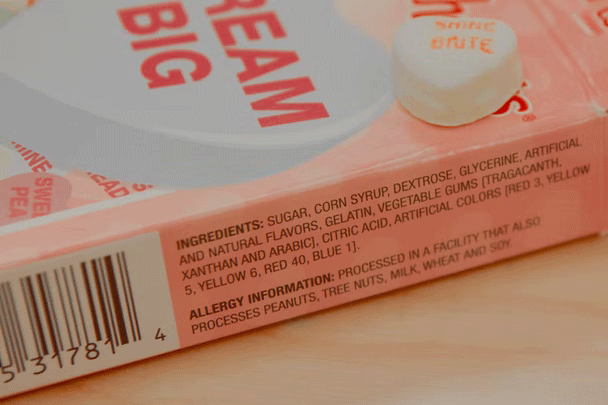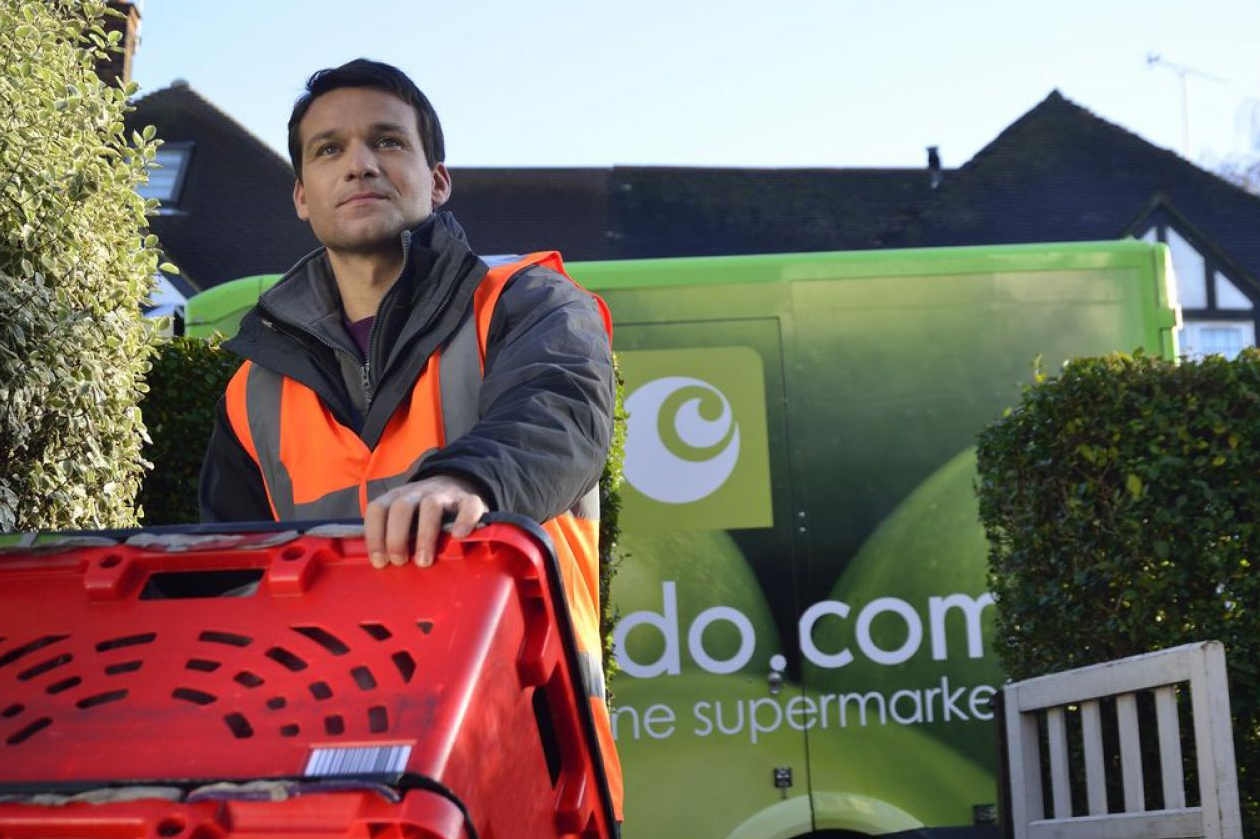February 14, 2022 Industry news
The latest instalment of these fortnightly sessions and the first to be powered by GS1 UK, saw Moorish founder Julie Waddell, Oatsu founder Lauren O’Donnell and Wholegood CEO Carl Saxton share insights into the opportunities facing emerging brands through Quick Comm retailers such as Getir, Jiffy, Gopuff and Gorillas.
'Quick Comm' – also known as on-demand or rapid delivery – refers to companies that deliver goods (typically groceries) in under an hour, or as quickly as in 10 minutes. The idea has come of age only in the past year-and-a-half as Covid-19 drove up digital adoption.

The future of grocery?
Carl Saxton described how Wholegood’s branded wholesale is now evenly split between large retailers and Quick Commerce sites. He described the latter as “an exciting part of the market” that could represent a seismic shift in the UK’s shopping habits.
“Changes like this in grocery only come along every 15 to 10 years” he said. “Last time it was Ocado which was considered a bit of a joke to begin with. They are now a major player who have transformed the way millions of people shop. Right now, there is a lot of money in the Quick Comm space with companies investing heavily in technology and customer acquisition. This whole new sector is fascinating as we still don’t really know what else is coming. Wholesalers such as Wholegood can play a major part in sustainability, but shorter supply chains will be absolutely key to this.”
Carl believes Quick Comm is here to stay. “Not all will survive and there will be consolidation” he said. “It takes huge amounts of capital to grow businesses like this as changing human behavior costs money, but it is not the first time this has been done. Getting things in less than 10 minutes can be transformative. It is about true convenience.”

It is not quite the gold rush opportunity it could be quite yet. Lots of brands are approaching the same buyers, all hoping to reach large numbers of potential customers. This needs huge scale to really work."
Carl Saxton
Wholegood
Working with Quick Comm retailers
But how can emerging brands break into the quick comm space? Carl emphasised it is important to remember that success is driven by buyers rather than wholesalers, making it vital for brands to ensure they are seen by reaching out to consumers directly.
Julie Waddell, whose award winning Humous range is now a much-loved brand sold by major retailers across the country, agreed.

It’s not just about getting the listing. It is about becoming the brand that drives category growth."
Julie Waddell
Moorish
Since ‘inventing’ smoked humous in her home kitchen back in 2012, Julie’s brand has grown exponentially with Moorish products now being stocked in Sainsbury’s, Asda, Ocado, Booths, Whole Foods Market and Planet Organic as well as farm shops and delis.
Julie explained that the first step is simply getting shoppers to try your product and how sampling was an excellent way into their baskets. Once growing numbers of consumers came to know and love the brand, she secured listings in Wholegood, providing her with a direct route into Quick Comm. After realizing that the level of investment required to drive product growth varied widely between Quick Comm retailers, she began proactively reaching out to better understand how she could support them in driving sales.
Lauren O’Donnell’s overnight oats brand Oatsu has enjoyed enormous success selling directly to consumers online, and is now looking to reach millions of new customers through Quick Comm. She initially approached Getir and Gorillas before Jeffir reached out through LinkedIn. Since then, Jeffir have proven to be supportive and flexible, working collaboratively with Lauren to grow her brand.
Due to the one-week shelf life of her product, Jeffir felt next day delivery to all 12 sites that currently stock Oatsu would be the most efficient and safest option. As a result, both parties agreed that a 20% off promotional offer would be the best approach for introducing the brand to new customers with the margin reduction split evenly between the two.

Promotions and case study reels for social media helped a great deal” Lauen said. "Make sure you capture some great photography of your products as this will help retailers promote your brand by pushing you up to the reduced offers section of their apps for more visibility."
Lauren O'Donnell
Oatsu

Having your GS1 UK barcodes, data, BRC and SALSA accreditations in order is essential for securing a listing.
Trusted data – a critical superpower
As well as ensuring brand visibility, Carl, Julie and Lauren repeatedly stressed the importance of thorough preparation before approaching Quick Comm retailers.
“You really need to have all your ducks in a row,” said Carl. “Having your GS1 UK barcodes, data, BRC and SALSA accreditations in order is essential for securing a listing. Make sure you are ready. You will immediately stall if you can’t list as soon as a wholesaler wants your product. It is not as simple as presenting and selecting, the entire process is very much driven by buyers.”
“You need to take the same approach as if you were targeting a massive retailer” he added. “Do your research and approach a buyer to let them know you have a listing with a supplier who already goes to them.”
“Still, no wholesaler is the gatekeeper to quick commerce. These companies choose who they work with, so I am very much in the business of ensuring 99% availability and that deliveries arrive on time.
"As a wholesaler I don’t really care about the product itself, I just need to make sure it is in stock and deliverable. To do this I need to make sure they arrive at hundreds of locations each week by building out a large and efficient logistics network and this can’t be achieved without accurate and trusted data from my suppliers. While each Quick Comm retailer is unique and can be approached differently, all have massive logistical requirements.”
Lauren O’Donnell echoed the importance of preparation and trusted data. Oatsu products are sent direct, allowing Jeffir to guarantee customer safety while targeting specific locations. When asked which areas of London she wanted to target first, she compared options against Oatsu’s direct to consumer email list and Shopify data to see where existing customers were based. Jeffir then gave her the freedom experiment, testing a variety of locations. Gathering reliable data was essential for identifying the best locations and enabled them to swap out low performers for more promising alternatives.
While Moorish successfully progressed from the start up stage to become a widely recognised brand, Julie Waddell still must ensure that her barcodes, pricing, and product information are well maintained before pitching to potential new retailers. She advised those looking to enter Quick Comm to “look at what is already out there in your category. Find out who the buyer is, where your USP fits in and understand its appeal to the shopper demographic. Make sure you can work backwards to make your margins and pricing work. Dropping in to every location can be costly so laying solid foundations will help you avoid any nasty surprises.”
Several viewers raised questions about shopper demographics during the Q&A section of the discussion. In response, Carl explained that while retailers would never publicly share such commercially sensitive information, brands can still gain valuable insights by exploring the apps themselves. “Don’t get too hung up on who is using them” he said. “Look at the categories they have and, if your product fits one they are currently missing, that is where you could really win. But again, don’t approach anyone until you are confident you have your ducks in a row.”
Julie took a similar approach to identifying new targets. She used the apps to see which brands were already there and get a sense of their media spend. She also spoke to the shoppers who use them and believes that while most appear to be “young affluents”, the demographic is becoming much broader with increasing numbers of families and parents seeking fast, convenient access to essential products such as Calpol.
Looking to the future
All three panelists expressed optimism about the potential of Quick Comm and the data that powers it to drive positive change. While some may claim that such a shift could negatively impact sustainability with more packaging and transport on the roads, Carl Saxton argued that the opposite is the case. “One Ocado van takes 10 cars off the roads and many of those using Quick Comm apps would have otherwise driven to buy groceries” he said. He then described how companies are investing heavily in electric scooters and assisted bikes, and that while consumers may not be overly concerned with how clean energy is further up the supply chain, they all want cleaner air in their cities.
Carl also discussed how a quick commerce revolution could lead to significantly less waste as goods don’t need to look beautiful, sitting in full packs on a shelf to attract shoppers. “When there is real scale to this, brands may well reduce investment in packaging as shop front appeal is no longer needed. In the future people may simply buy based off photos online so there is lots of potential change to come."

One Ocado van takes 10 cars off the roads and many of those using Quick Comm apps would have otherwise driven to buy groceries.
Julie agreed that a “future without packaging is a fascinating prospect” and believes that to really improve long-term sustainability, Quick Comm needs to expand beyond the cities to serve shoppers in more remote, rural locations where consumers often have no choice but to drive to buy goods.
Carl, Julie and Lauren ended their discussion by reminding viewers of the incredible potential a shift towards convenience based online shopping presents to emerging brands. Julie said “We know it is harder for smaller brands to get in with the big guys but getting into Quick Comm now and the growth that is coming could be a huge opportunity.
Carl concluded by saying “the market is massive so it is hard to know how big these guys will be, and competition is not really relevant now. Consider from a brand perspective how difficult it would be to engage with 100 independents versus establishing good relationships with the biggest buyers to offer samples or promotions. If you do this through Quick Comm you will reach a lot of customers in a very efficient way will get back much more than a signed delivery form. These are data businesses after all.”
Upcoming Bread & Jam events
Sign up for future webinars
Bread & Jam host a series of free online fortnightly panel discussions featuring three successful entrepreneurs. Designed to keep the food and drink community connected and informed, each session focuses on a different issue faced by emerging food & drink
Bread & Jam Festival 2022
Super Early Bird tickets now available. A festival for food & drink brands to network, learn from each other and scale up fast, this year’s fully in-person event will be held at the Business Design Centre in Islington, London, 19 - 20 July.
The Future Summit 2022
Powered by GS1 UK and hosted by Joelson, this in-person event at 2 Marylebone Road, London, April 22, will be packed with practical advice and examples of how you can build sustainability into the core of your business.
Related news

What are the key challenges retailers and suppliers are facing from HFSS?
Podcast with Young Foodies and GS1 UK to discuss HFSS in more detail.

GS1 UK partners with the Great British Entrepreneur Awards
To continue our support for small businesses we are delighted to announce that the Great British Entrepreneur Awards have become one of our community partners.
